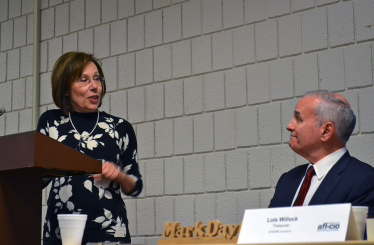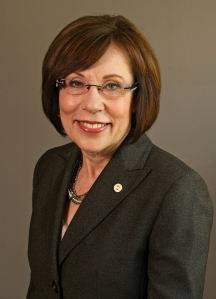

Share

Shar Knutson ascended the ranks of Minnesota’s labor movement, starting as a member of AFSCME Local 1842 in St. Paul and retiring after six years in the state’s highest union office. Remembered by colleagues and friends as a bridge-builder, trailblazer and mentor, Knutson died Feb. 2 at the age of 72.
A native of Fridley who made St. Paul her home, Knutson made history in 2009 as the first woman elected president of the Minnesota AFL-CIO, the federation of over 1,000 affiliate unions representing 300,000 working people statewide.
Knutson held the office until 2015, during a tumultuous time for American unions. Efforts to weaken workers’ bargaining power and roll back labor standards succeeded in other states, but not in Minnesota. Under Knutson’s leadership, Minnesota unions not only kept “right to work” and other anti-union measures at bay, but they lobbied to expand collective bargaining rights and pass the first statewide minimum-wage increase in a decade.
“Shar played an active role in the successful campaign to increase labor’s voice in national, state and local issues, including raising awareness and promoting community debate about social and economic justice,” U.S. Rep. Betty McCollum said. “This shift laid the groundwork for important progress being made today that benefits all Minnesotans.”
Labor leaders who worked with Knutson recalled her attention to detail, quiet resolve and ambition.
“She got her facts, and she moved forward,” said Ray Waldron, Knutson’s predecessor as president of the state AFL-CIO. “She was very decisive.”
It showed, Waldron remembered, when he approached Knutson in 2009 with the news that he planned to retire. Knutson had been serving as president of the St. Paul Regional Labor Federation and, previously, the St. Paul Trades and Labor Assembly for more than a decade.
“I walked into her office and said, ‘How would you like to run for president of the Minnesota AFL-CIO?’” Waldron said. “Shar didn’t hesitate. She just said yes, reached across her desk, shook my hand, and I walked out.”
Though self-assured, Knutson “was never a bully,” said Harry Melander, former head of the St. Paul and statewide Building Trades councils. Rather, she built her career on a knack for bringing people into the decision-making process and working in coalition.
“We all love each other, we’re family,” Melander said. “But families have fights. Shar made a point to make sure everyone, whether you got along within the labor family or not, was at the table when we had a big item to discuss, so we could figure this out together.”
Knutson grew up in a union household, but her ties to the labor and political communities deepened after leaving a public-health job with the City of St. Paul in 1990 to work for Mayor Jim Scheibel. At City Hall, she shared an office and a budding friendship with Molly O’Rourke, who said the two “bonded over that experience of working in a very fast-paced and energized office.”
Knutson was the mayor’s liaison to organized labor and other constituent groups, including the emerging immigrant and refugee communities. It was a good fit, O’Rourke said, given Knutson’s “belief that everyone, no matter their station in life, needed to be treated with dignity and respect.”
Scheibel declined to run for re-election in 1993, and Knutson went to work for the Trades and Labor Assembly. Delegates elected her president in 1998, and within weeks of taking office, St. Paul’s new mayor, Norm Coleman, stunned the city’s unions with a proposal to privatize a swath of city services, from golf courses to the water department.
Coleman’s “Compete St. Paul” plan threatened hundreds of city jobs, and union leaders looked to the Assembly to fight back, said Barb Kucera, then editor of The Union Advocate newspaper. Knutson worked quickly to convene the St. Paul Works Alliance, a coalition of groups that would oppose the privatization scheme.
“Right away, Shar brought in as many stakeholders as possible to be part of the discussion, leading with the unions but inviting other organizations too,” Kucera said. “She really decided to mount a public campaign, and that’s what eventually stopped the whole idea in the fall of 1999.
“Shar really pushed the organization to focus and get a clear message across, and she did a lot of media appearances and events and public speaking. They talked about jobs, but they didn’t make it about jobs only. They very wisely chose to make it clear this was going to be a real threat to public services in the city, particularly the water service.”
Defeating Coleman’s plan drew national attention, and Knutson was among a handful of local labor council presidents invited to serve on an advisory committee to the AFL-CIO Executive Board. “She was willing to try to do some things differently, and she projected a different image, being the first woman and first public employee in that job,” Kucera said.
“She surprised a lot of people in Washington, D.C.,” Waldron added. “She was courageous.”
Knutson’s profile continued to grow after another successful, coalition-based campaign in 2006, this time to save 500 jobs at a paper recycling plant in the Midway. The plant, then owned by Rock-Tenn, needed a new power source after Xcel Energy stopped burning coal at its High Bridge plant. But opposition from neighborhood groups put Rock-Tenn’s future – and the jobs of Steelworkers like Bob Ryan – in doubt.
Ryan, who now works as the rapid response coordinator for his union, called Knutson “instrumental” in keeping USW Local 264 members working in St. Paul.
“It was a lot of public meetings, and Shar was at a lot of them with us, speaking on our behalf,” he said. Both Knutson and her father had worked at the facility, he said, “so Shar could talk to people with true emotion about how long the plant had been there and its connection to the city. She just delivered.”
Knutson introduced former Gov. Mark Dayton at a union event in 2013.
By then, the Assembly had merged with surrounding labor councils to form the Regional Labor Federation, with Knutson as president. She won a three-way race for president of the state AFL-CIO in August 2009, and guided the union campaign to elect Minnesota’s first labor-endorsed governor in 20 years, Mark Dayton, a year later.
As her list of accomplishments grew, Knutson continued to prioritize her work to mentor women and young workers pursuing leadership roles in the labor movement and in politics.
Those fields were even more male-dominated 22 years ago, when McCollum became just the second Minnesota woman elected to federal office, than they are today. The 4th District congresswoman remembered Knutson and longtime friend Robin Madsen, an AFSCME leader who died in 2017, teaming up to host a “Working Women for Betty” campaign-kickoff event after McCollum announced her first run for Congress.
Knutson and McCollum remained friends as their careers progressed. Knutson attended President Barack Obama’s first State of the Union address as McCollum’s guest, and the congresswoman presented her friend with a flag flown over the U.S. Capitol upon her retirement from the Minnesota AFL-CIO.
“I am thankful I had the opportunity to know and work with Shar Knutson,” McCollum said. “Her presence will be missed, but her legacy lives on.”
Jennifer Guertin, president of AFSCME Local 2508, called Knutson a source of “quiet support” going back to the days when delegates to the Trades and Labor Assembly were “75 to 80% men.”
“There were times when I was so frustrated by the guys that I was like, ‘I’m done, I can’t do this anymore,’” said Guertin, now the federation’s sergeant at arms. “Shar would take me aside and say, ‘You have to learn how to deal with people that don’t know what you’re capable of. You can’t let them win.’”
Current Regional Labor Federation President Kera Peterson counts herself among the countless other union members Knutson took time to mentor.
“President Knutson helped us grow as people, advocates and leaders, and she fostered connections among us,” Peterson said. “I don’t know that many of us realized it at the time, but Shar was building a network of union and community activists with an eye towards our future.
“I’m grateful that she took a long view on what our labor movement can accomplish together, and for the investments she made in all of us.”
Knutson was also quick to remind young activists about the importance of work-life balance. “A lot of times during campaigns, when I was pretty much living at the Labor Centre because that’s what we did, she was the one to tell me that I needed to go home sometimes, too,” Guertin said.
Knutson, who raised two daughters as a single working mother, “was really dedicated to her family,” O’Rourke said. “I think they gave her a lot of strength.”
Although Knutson spent more time with family and friends after retiring in 2015, Alzheimer’s disease progressively limited her independence.
“It was hard to see such a strong and powerful and articulate woman not really know the amazing impact she had on people around her,” O’Rourke said.
“She was a friend of mine, a good friend to me and to a lot of people,” Melander added. “It’s hard because she didn’t have enough time to enjoy the fruits of her labor.”
Knutson’s family has published an obituary at BradshawFuneral.com. They plan to hold her memorial service later this spring.

